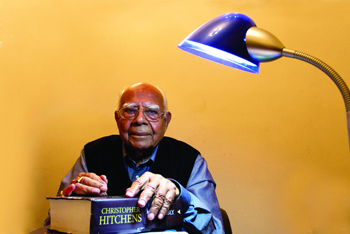
I'M NOT A light reader. I don't read fiction, for instance; only books on philosophy, religion, politics or economics. I was born in a city in the province of Sindh in Pakistan, where I went to the New Era School. My early reading happened there as a child, in the school library. Most of the books were by English authors. I came from an educated family — my father was a lawyer, so was my grandfather and, pardon my impudence, I was quite a bright student. I passed my matriculation at the age of 13. I finished my LLB at the age of 17.
When I was in Class III, I read a whole poem by Sir Edwin Arnold from The Light of Asia, his book about the Buddha. Recently, in my column for the Sunday Guardian, I borrowed a phrase from Arnold that seemed apt. I wrote that this government might survive because of the numbers game, but “the lamp has lost its oil and the wick burns black”. Since Class III, I've read almost everything Arnold wrote. The Song Celestial is his rendering of the Bhagavad Gita. I can recite it from memory even today: “If one ponders on objects of the sense, there springs attraction, from attraction grows desire, desire flames to fierce passion, passion breeds recklessness; then the memory, all betrayed, lets noble purpose go, and saps the mind, till purpose, mind, and man are all undone.”
Books are the best friends a man can have. My book of the year is Salman Rushdie's Joseph Anton. He tells the unvarnished truth, which is what I most liked about it. I'm against all kinds of bans and fatwas. So yes, when the Shiv Sena called for a ban on a book on Shivaji — note, the Shiv Sena, not the BJP — I was against it. It's a matter of principle. I joined the BJP on my own terms. I said to them: “You have no right to change my views; I have the right to change yours.” That is why I'm not a leader of the BJP, only a minor member.
Another book I have enjoyed is Arguably, Christopher Hitchens' collection of essays. And Eric Hobsbawm's superb Age of Extremes. Regrettably, Hobsbawm died this year. He was quite an instructive writer, though a Marxist historian. I'm also a great admirer of Kant and philosophers of law and legality such as Jeremy Bentham. I read a lot of history. I have read all the 11 volumes of Will Durant's The Story of Civilisation. Another one that made a great impression is French historian Amaury de Riencourt's The Soul of India. It's a great, great book, as is The Soul of China.
People who don't read particularly misunderstand philosophy and religion. I'm Hindu, but a great student of Islam. People forget the essence of what Prophet Mohammed taught. What he taught is unrivalled. Nobody has ever taught a thing like that. Remember what the Angel Gabriel told the Prophet in his revelatory dream? “Read, read, read!” The Prophet never went to school, but he understood that what he was meant to communicate to his followers was to go out and seek knowledge. It was the Prophet of Islam who said: “When you walk in search of knowledge, you are walking in the path of God.” He also said, “The ink of a scholar is more valuable than the blood of a martyr.”
Thanks to the present government, no one ensures that real secularism is taught in our schools. Most politicians don't know the 's' of secularism. Gujarat Chief Minister Narendra Modi is much more secular than many in the media or government would have you believe. It would be too much to ask of them to actually read Article 25 of the Constitution. Now there's a new thought: reading to acquire information!





Comments
Add new comment